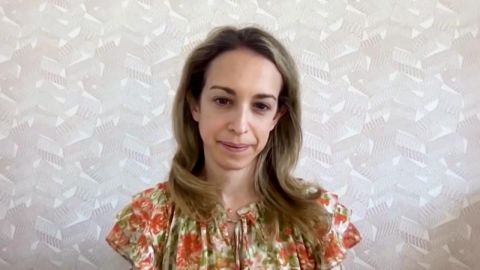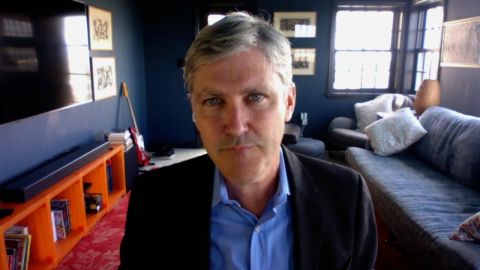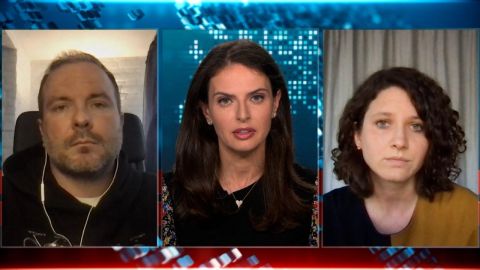Read Transcript EXPAND
BIANNA GOLODRYGA: Another reminder there that we need to take our mental health seriously, especially when it deals with children. And finally, they say a cat has nine lives. Well, our next guest says that humanity has gained an extra one. Steven Johnson is a bestselling science writer whose new book “Extra Life: A Short History of Living Longer” looks at discoveries that lead to the average life expectancy doubling in the last century. It’s also the topic of his series of the same name airing on PBS and BBC Four, co-hosted with broadcaster and historian, David Olusoga. Steven Johnson is joining me from New York. Steven, great to have you on. And this is very encouraging. We’ve been dealing with headlines over the past year and a half that have not been so much. And here, you put into context the number of lives, around 100 million, that are estimated to have been lost in the 1918 great influenza compared to 3 million, again, a horrific number, but that’s 3 million today with the pandemic and COVID when a global population has quadrupled. What can you do to put that in perspective for those who seem to just focus on the tragedy of today?
STEVEN JOHNSON, AUTHOR, “EXTRA LIFE: A SHORT HISTORY OF LIVING LONGER”: Well, thank you for having me on. And it is a tragedy. We can’t take anything away from that. I mean, it has been a horrible year. But what I’ve tried to do with this book and the show is try and take the longer view of human health. If we went back to that era during the Spanish flu in 1918 to 1920, just about 100 years ago, life expectancy in the United States was 41, around the world, it was probably in the mid-30s. And so, today, globally, this is not just a story about, you know, the industrialized west, globally, life expectancy is now 73. So, we doubled the average human life in 100 years. And we don’t tend to focus on that story which is one of the most extraordinary things we’ve ever done and probably the single most important thing that’s happened in the last 100 years. We don’t really focus on it because it’s slow and incremental, it’s built out of thousands of small changes and innovations that improve our health, you know, in innumerable ways.
GOLODRYGA: Yes.
JOHNSON: And so, we lose track of it and we have to kind of step back and say, oh, look, let’s take kind of the long view of this progress and remind ourselves of how far we’ve come.
GOLODRYGA: Yes. You’re right. In effect, during the century since the end of great influenza outbreak, the average human lifespan has doubled. There are a few measures of human progress more astonishing than this. If you were to publish a newspaper that came out just once a century, the banner headline surely would or sure be that this should be the declaration of this incredible feat. But you’re right, we seem to focus on more of a narrow timeframe than the longer timeframe. Can walk us through what made that possible that we’ve doubled our life span in just a century?
JOHNSON: Yes. And that’s really the mystery that both the book and show are trying to wrestling with, it’s how does change happen, right? How do — when we see changes this big, like what drives that story? And in the case of health, sometimes it is things that we take for granted. I mean, there was amazing fight in late 19th century and early 20th centuries to clean the drinking water, preclean in big cities. So, it’s a major — I mean, this is something we’ve forgotten. But 130 years ago, if you lived in a big city, you could drink a glass of water and be dead from cholera 48 hours later. That was just commonplace thing that happened. It was particularly dangerous for young children. Something like 40 percent of children died before reaching adulthood, well into the — kind of the end of the 19th century. So, just doing basic infrastructure things, like cleaning drinking water, building sewer systems, chlorinating drinking water, that made a huge difference. And then, you know, one of my favorite stories in this whole project is the mass vaccination campaign that led to the eradication of smallpox. And this is an extraordinary achievement. I mean, we took what was a deadly and terrifying disease that killed everyone in society, the richest people in the world and the poorest people in the world. And in the middle of the 1970s, we eradicated it entirely. No one has died from smallpox in the while since around 1975.
About This Episode EXPAND
100 years ago, on 31 May and 1 June, an estimated 300 Black people were killed in a rampage by a white mob in Tulsa, destroying a wealthy neighborhood known as America’s Black Wall Street.
LEARN MORE



